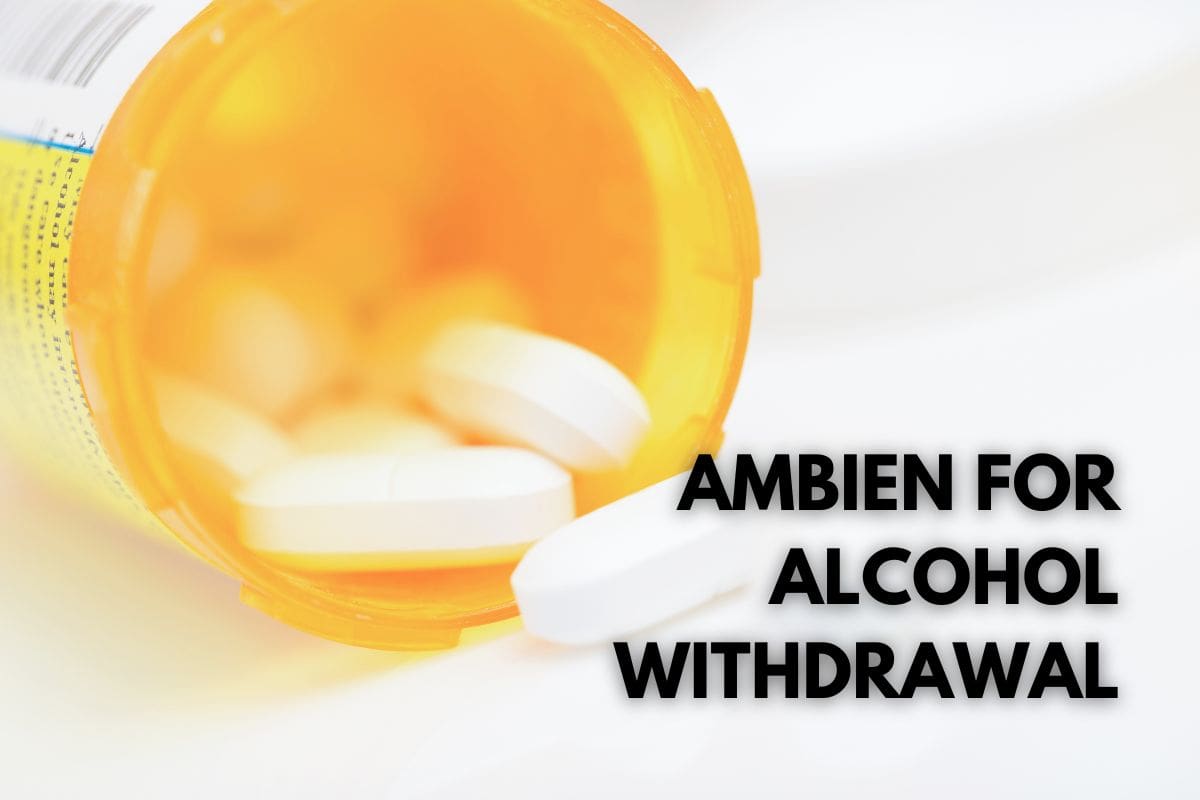Insomnia is a common symptom of alcohol withdrawal, especially in the early stages of recovery. In fact, sleep disturbances can persist for months despite continued abstinence.
Some studies have shown that sleep disturbances can increase the chance of relapsing. Because of this, many rehab facilities incorporate Ambien as part of their medically assisted detox protocols.
Ambien is a sleeping medication that can help treat insomnia. While effective, it does not mix well with alcohol, making relapsing while taking Ambien potentially risky. This article will explore the pros and cons of using Ambien to treat insomnia during alcohol withdrawal.
Ambien for Alcohol Withdrawal-Induced Insomnia
Zolpidem (Ambien) is a safe and effective medication to help treat sleeping problems in nonalcoholic patients. The drug can also positively affect recovering alcoholics who have insomnia during acute withdrawal.
Addicted alcoholics should be wary of using Ambien because the drug has a high potential for abuse, particularly among alcoholics. Also, Ambien’s withdrawal symptoms could cause problems without medical supervision.
Nonetheless, Ambien for alcohol withdrawal is a common treatment. If you or someone you know is considering Ambien as part of their treatment plan, here’s what to know.
Pros:
- It acts quickly, generally within 30 minutes. The peak effects occur between 1 and 2-and-a-half hours after taking the pill.
- There’s an oral spray version for people who have trouble swallowing.
- Immediate-release pills can be safely cut or crushed.
- It can contribute to recovery from sleep disturbances in 7 to 10 days.
Cons:
- Possible side effects include dizziness, constipation, and uncontrollable shaking.
- Other possible, more serious side effects include chest pain and difficulty breathing. Even more rarely, it can cause unwanted nighttime behaviors like sleepwalking, sleep eating, and engaging in sexual behavior while asleep.
- Not meant to be used for more than a few weeks, as it may lead to dependence and addiction.
- It can cause withdrawal symptoms (such as rebound insomnia) if discontinued overnight.
- The potential to abuse is higher in alcoholics.
- It has a higher risk of overdose when combined with alcohol, making it risky to prescribe to recovering alcoholics.
Should You Use Ambien To Treat Insomnia Caused By Alcohol Withdrawal?
Alcohol is among the most commonly abused drugs in the U.S. and worldwide. Around 15 million Americans aged 12 and older have an alcohol use disorder (AUD), according to the 2019 NSDUH.
Despite how common it is, relatively few people seek help for AUD. According to the 2019 NSDUH, only 7.2% of people ages 12 and older who had AUD in the past year received any treatment in the past year.
Most addiction treatment specialists do not recommend Ambien for alcoholic patients, rather they recommend using benzodiazepines during acute alcohol withdrawal.
Ambien can be an effective sleeping pill for recovering alcoholics who have insomnia, but the fact is that alcoholics are at a higher risk of abusing these medications. Also, the higher risk of overdose that comes with mixing alcohol and Ambien makes it a potentially dangerous combination that most addiction specialists recommend against.
The Risk of Ambien Addiction
While Ambien has a relatively low potential for abuse in nonalcoholic patients, alcoholic patients are at a higher risk of developing dependence and addiction.
If taken for more than two weeks, patients may become psychologically dependent on it to fall asleep. Additionally, they may need higher doses as they develop tolerance, which increases the risk of addiction and overdose.
If an alcoholic relapse is added into the mix, overdose risks increase considerably.
Treatment For Alcohol Withdrawal Symptoms
Alcohol withdrawal symptoms include:
- Anxiety
- Shakiness
- Profuse sweating
- Vomiting
- Fast heart rate
- Mild fever
If you suspect you suffer from alcoholism and present these symptoms when stopping your drinking habits, visit a physician.
If they determine you are suffering from alcohol withdrawal, based on your history (or lack thereof) of substance abuse, they may recommend you receive professional treatment:
- Medical detox is often the first step of treatment. This is especially important for polysubstance abuse. Patients in a medical detox facility are closely monitored to manage withdrawal symptoms and avoid relapse or side effects.
- Inpatient treatment is the most intense and involved. You’ll spend a certain amount of nights in the facility so healthcare professionals can monitor your progress 24/7.
- Outpatient treatments mean you sleep at home but receive treatment in your spare time for the stipulated time.
It’s important to remember that alcohol withdrawal can be treated, and it doesn’t have to be as difficult as you think. Overcoming these hurdles with professional help and receiving the treatment and support needed can help you begin your recovery journey.

































